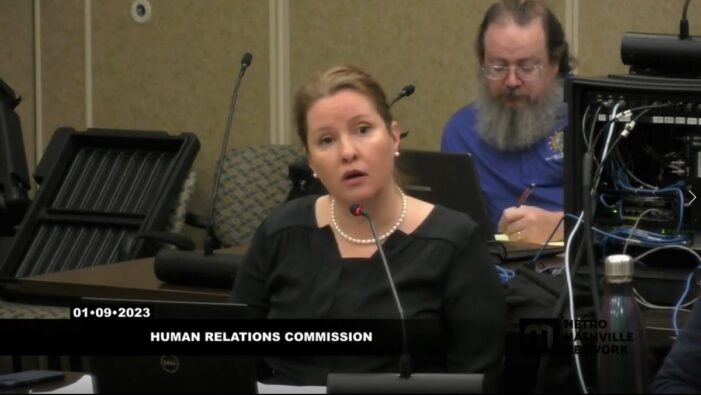
WATCH BELOW: Our own Amy Charlton spoke to the Metro Nashville Human Relations Commission about the importance of transgender youth receiving gender-affirming care. After editing for clarity, the MHRC unanimously approved her statement. We will continue to support + advocate for our transgender youth friends + family.
Read the full statement here.
Our advocacy is guided by the Metro Human Relations Commission’s mission, “to protect
and promote the personal dignity, peace, safety, security, health, and general welfare of all
residents of Nashville and Davidson County.” As such, we must support transgender youths’
access to health care in Nashville. We recognize the urgent need for healthcare providers to
resume providing transgender youth with access to medically necessary gender-affirming
care.
Currently, SB1/HB1 bans gender-affirming care for youth. Followed by SB5 which is another
bill banning gender-affirming care for youth Also, SB3/HB9 makes it possible for police to
arrest transgender individuals performing or busking in drag.
Policymakers can help build a healthier population by promoting medically necessary care
for transgender youth. Many global meta-analyses and local experts highlight the critical
need for the care of transgender youth. Current research demonstrates policies that
discriminate against transgender people exacerbates mental and physical health problems.
Transgender youth are a vulnerable group and laws that make it more difficult for them to
receive gender-affirming care will isolate them even further. These issues can be addressed
by ensuring that healthcare policies and practices are collectively compassionate and adhere
to best practices as indicated by healthcare providers.
According to the 2015 U.S. Transgender Survey Tennessee State Report, 53% of K-12
transgender youth in Tennessee experienced verbal harassment, 22% experienced physical
assault, and 10% experienced sexual assault. Fifteen percent of homeless youth in Nashville
identity as LGBTQIA. In a local survey titled “TAY-VI-SPDAT” the youth cited conflicts around
gender identity or sexual orientation as reasons for their homelessness.
MHRC supports Nashville and Davidson County transgender and gender-diverse youth and
affirms the local advocacy efforts on behalf of our transgender youth at My House, Nashville
LaunchPad, Oasis Center, Tennessee Equality Project, PFLAG, Glendale United Methodist
Church, First Unitarian Universalist Church, the Clinic for Transgender Health at Vanderbilt
among countless others.
This statement cites research showing transgender youth without gender-affirming care
have an increased risk for suicide. The research demonstrates that trans youth experience
significantly reduced suicide risk when they have continued access to gender-affirming care.
We join thousands of healthcare providers in these efforts of maintaining gender affirming
care access including supportive publications made by the American Academy of
Pediatrics, American Academy of Child and Adolescent Psychiatry, and World Professional
Association for Transgender Health. Therefore, MHRC urges lawmakers to oppose any laws
that limit healthcare options for gender-diverse youth.
References
2022 U.S. Trans Survey. “2015 U.S. Transgender Survey Report — 2022 U.S. Trans Survey.” Accessed January 6, 2023.
https://www.ustranssurvey.org/reports.
American Academy of Child and Adolescent Psychiatry, January 6, 2023.
https://publications.aap.org/aapnews/news/19021/AAP-continues-to-support-care-of-
transgender?autologincheck=redirected.
“Association of Gender-Affirming Hormone Therapy With Depression, Thoughts of Suicide, and Attempted Suicide
Among Transgender and Nonbinary Youth.” Journal of Adolescent Health 70, no. 4 (n.d.): 643–49. Accessed
January 6, 2023. https://doi.org/10.1016/j.jadohealth.2021.10.036.
Barbee, Harry. “Anti-Transgender Legislation—A Public Health Concern for Transgender Youth.” JAMA Pediatrics 176,
no. 2 (February 1, 2022): 125–26. https://doi.org/10.1001/jamapediatrics.2021.4483.
“Behavioral Health Diagnoses in Youth with Gender Dysphoria Compared with Controls: A PEDSnet Study.” The
Journal of Pediatrics 241 (n.d.): 147-153.e1. Accessed January 6, 2023.
https://doi.org/10.1016/j.jpeds.2021.09.032.
Hughto, Meyers, Mimiaga, Reisner, and Cahill. “Uncertainty and Confusion Regarding Transgender Non-
Discrimination Policies: Implications for the Mental Health of Transgender Americans.” Sexuality Research
and Social Policy 19, no. 3 (June 11, 2021): 1069–79. https://doi.org/10.1007/s13178-021-00602-w.
“Metropolitan Development and Housing Agency.” Accessed January 6, 2023. http://www.nashville-mdha.org/.
Richard, Bonnie. “Position Statement on Treatment of Transgender (Trans) and Gender Diverse Youth,” n.d. Accessed
January 6, 2023.
Surace, Fusar-Poli, Vozza, Cavone, Arcidiacono, Mammano, Basile, et al. “Lifetime Prevalence of Suicidal Ideation and
Suicidal
Behaviors in Gender Non-Conforming Youths: A Meta-Analysis.” European Child & Adolescent Psychiatry 30, no. 8
(March 13, 2020): 1147–61. https://doi.org/10.1007/s00787-020-01508-5.
“Tennessee General Assembly Legislation.” Accessed January 6, 2023.
https://wapp.capitol.tn.gov/apps/BillInfo/default.aspx?BillNumber=SB0001&GA=113.
“Tennessee General Assembly Legislation.” Accessed January 6, 2023.
https://wapp.capitol.tn.gov/apps/BillInfo/default.aspx?BillNumber=SB0003&GA=113.
“Tennessee General Assembly Legislation.” Accessed January 6, 2023.
https://wapp.capitol.tn.gov/apps/BillInfo/default.aspx?BillNumber=SB0005&GA=113.
